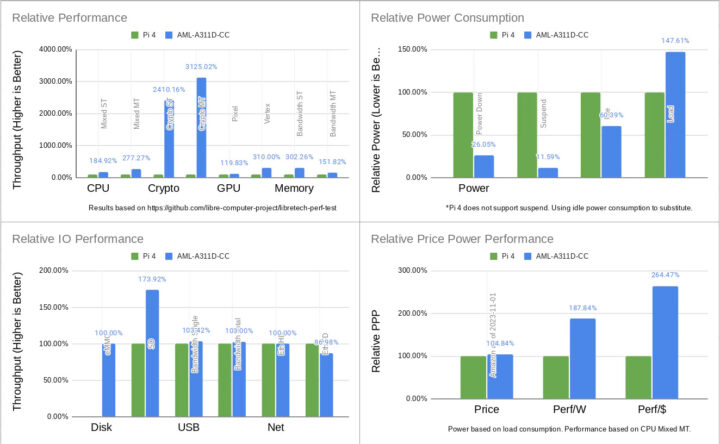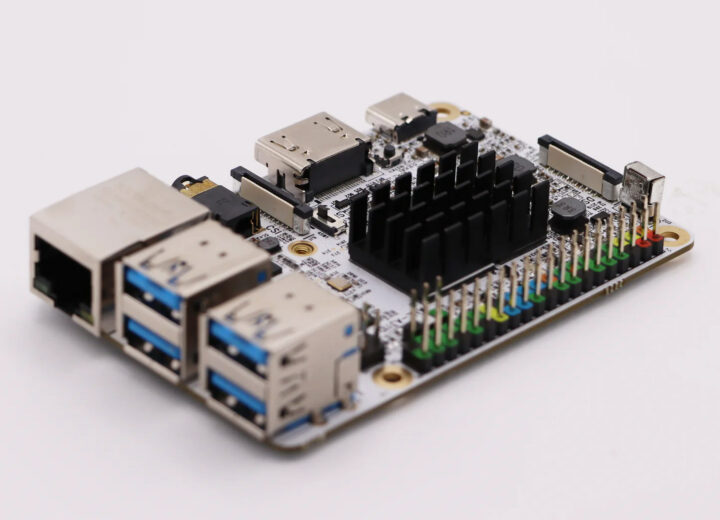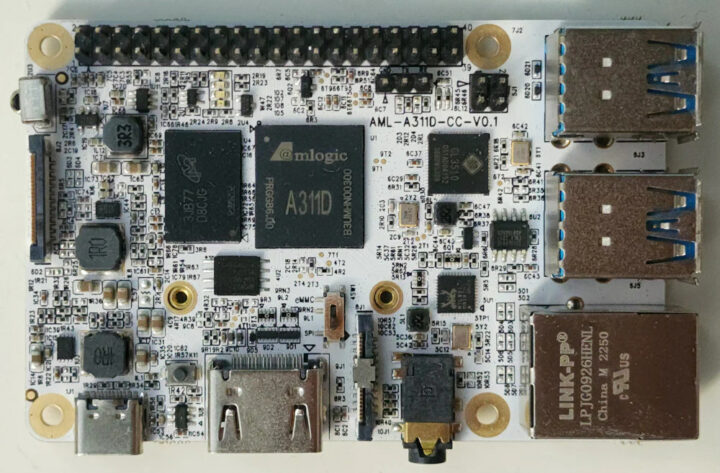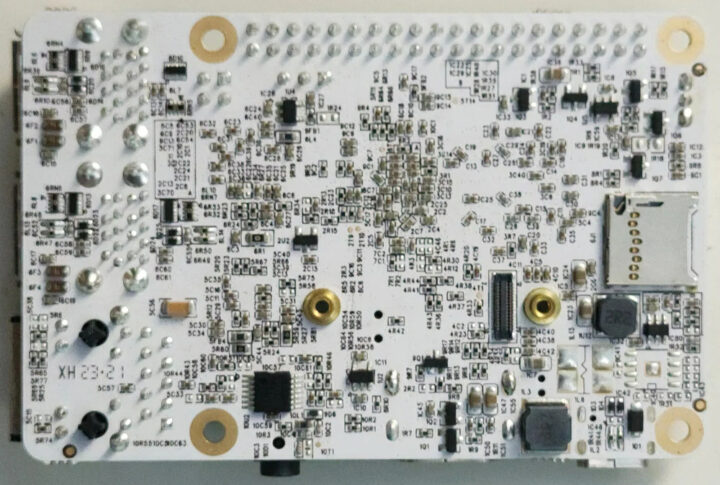Libre Computer has launched the credit card-sized “Alta” SBC, also known as AML-A311D-CC, designed for AI applications with the Amlogic A311D hexa-core Arm Cortex-A73/A53 processor equipped with a 5 TOPS AI accelerator.
The board comes with 4GB LPDDR4, a 16MB SPI flash for the bootloader as well as a microSD card slot and eMMC flash module connector for storage, and offers many of the same ports as found on the Raspberry Pi 3 Model B+ with Gigabit Ethernet, four USB 3.0 ports, HDMI output, an AV jack, MIPI CSI and DSI connector, and a 40-pin GPIO header that should work with most Raspberry Pi HATs.
AML-A311D-CC “Alta” specifications:
- SoC – Amlogic A311D
- CPU
- Hexa-core processor with 4x Arm Cortex-A73 cores @ up to 2.2 GHz and 2x Cortex A53 cores @ up to 1.8 GHz
- Built-in Cortex-M4 core for “always-on” processing
- GPU – Arm Mali-G52 MP4 GPU
- VPU
- 4K UHD H.265 75fps 10-bit video decoder & low latency 1080p H.265 / H.264 60fps decoder
- Supports multi-video decoding up to 4Kx2K@60fps + 1x1080P@60fps
- AI accelerator – 5.0 TOPS NPU @ 800 Mhz with support for Tensorflow, Caffe, and other deep-learning frameworks
- CPU
- System Memory – 4GB LPDDR4
- Storage
- 16MB SPI Nor flash for bootloader/firmware
- eMMC 5.x flash module connector
- MicroSD card slot with UHS SDR104
- Video & audio output
- HDMI 2.0 output
- 3.5mm AV jack for composite and stereo analog audio
- 4-lane MIPI DSI via 22-pin connector
- Camera – 4-lane MIPI CSI via 22-pin connector as found on the Raspberry Pi Zero W
- Connectivity – Gigabit Ethernet RJ45 port with optional PoE support
- USB – 4x USB 3.0 Type-A ports, 1x USB 2.0 OTG Type-C port with USB PD support
- Expansion – 40-pin GPIO header mostly compatible with the Raspberry Pi GPIO header
- Misc – IR receiver
- Power Supply
- 5V via USB-C port
- Power over Ethernet
- 5V via GPIO header
- Power Consumption – 1W idle power consumption (for reference my Raspberry Pi 5 was around 3W at idle with WiFi only)
- Dimensions – 85 x 56 mm
The Amlogic A311D was launched in 2019 and first found in the Khadas VIM3 SBC that we reviewed in both Android and Linux, and we also spent some time experimenting with the 5 TOPS NPU in Linux. So why bother launching a new SBC with a 4-year-old processor? That’s because Libre Computer has a different mission/business model and the company focuses on providing boards with as much upstream support as possible, and what really takes time is getting mainline Linux and other parts of the software to work on the hardware.
In practice that means the Ata SBC is compatible with Arm SystemReady IR operating system and incorporates a UEFI bootloader that can boot standard Linux distributions out of the box including any official Libre Computer images (Ubuntu, Debian, and Raspberry OS-based) or others such as Fedora and OpenSUSE. The company also mentions upstream AI and neuro-computing support, but I could not find any specific reference in the documentation, so I initially supposed they were just using the Rockchip RKNN-Toolkit2, but I eventually found a blog post about upstreaming the Teflon Delegate to the Mesa project. The documentation is all over the place and I find it a bit hard to navigate…

Libre Computer AML-A311D-CC “Alta” AI SBC is available for pre-order for $60 on LoverPi online store with deliveries starting on November 24. If you don’t need such as powerful SoC and an Amlogic S905D3 with a 1.2 TOPS NPU can do the job, you could alternatively pre-order the AML-S905D3-CC for $45 with the same form factor and software support. The company is also working on the AML-A311D-CM system-on-module mostly compatible with Raspberry Pi CM4 and that should be similar to the Banana Pi BPI-CM4 but with more recent software using the latest Linux kernel and scheduled for release on March 2024.
Thanks to Thomas for the tip.

Jean-Luc started CNX Software in 2010 as a part-time endeavor, before quitting his job as a software engineering manager, and starting to write daily news, and reviews full time later in 2011.
Support CNX Software! Donate via cryptocurrencies, become a Patron on Patreon, or purchase goods on Amazon or Aliexpress







